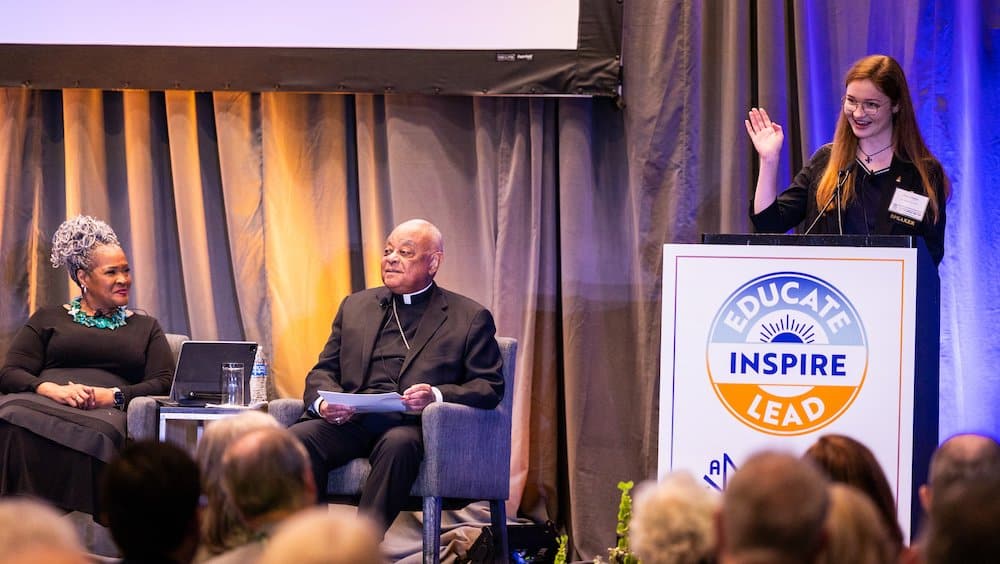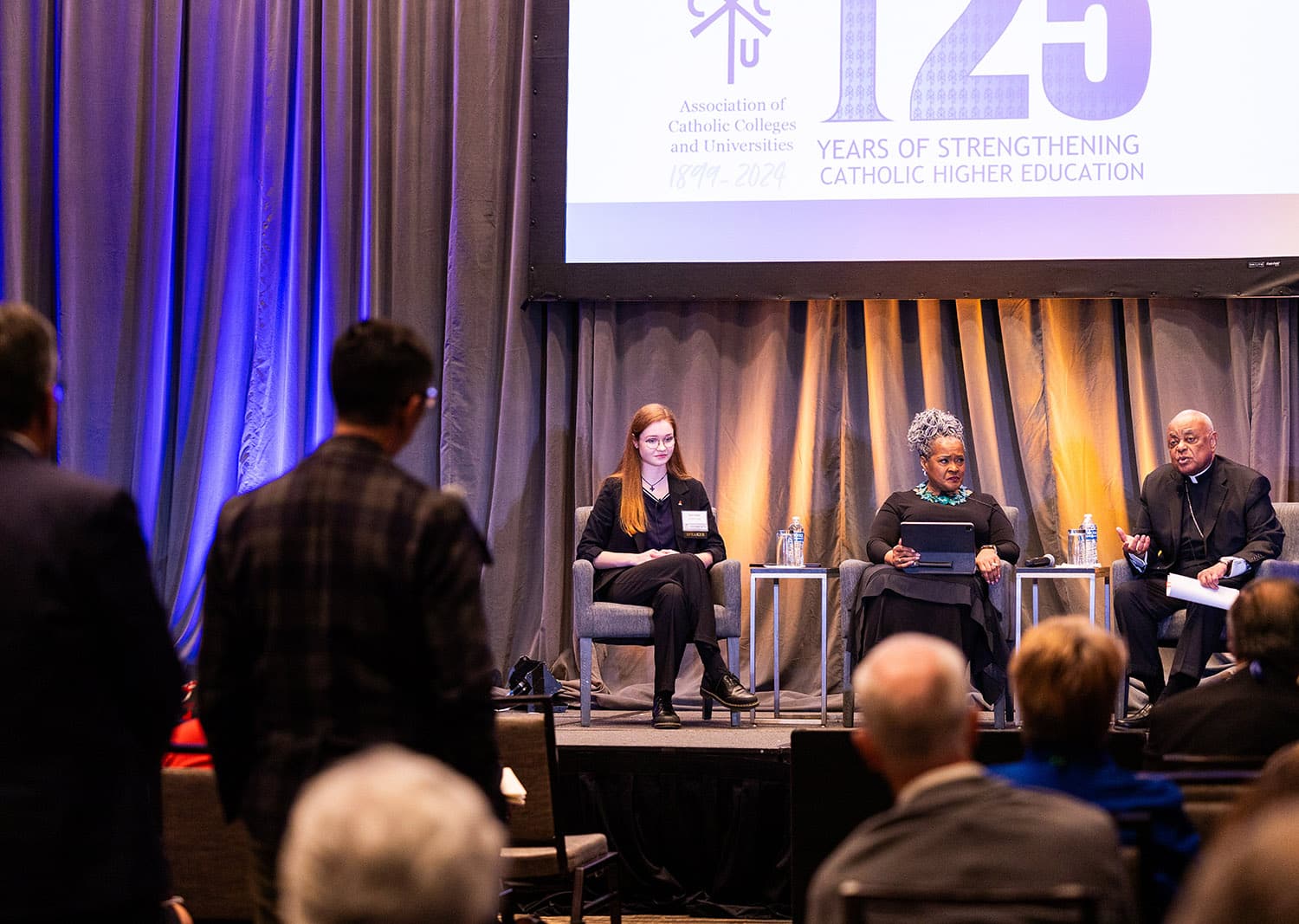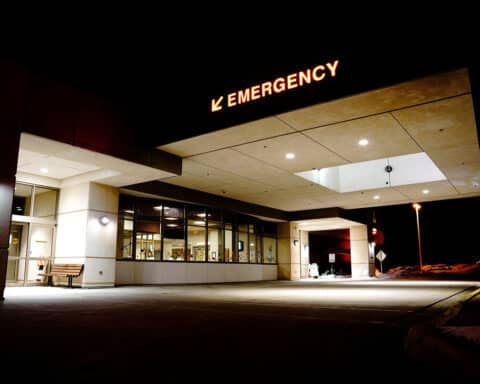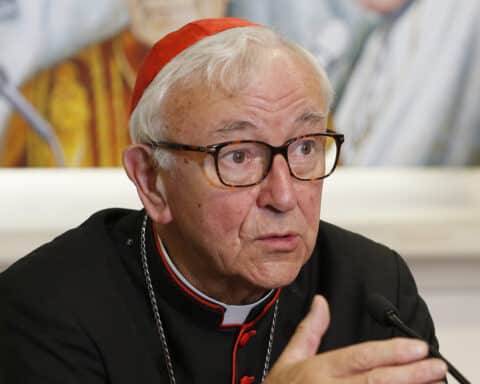WASHINGTON (OSV News) — The Synod on Synodality, “a meeting about meetings,” as it has been called, is primarily a process for becoming a better Church, said Washington Cardinal Wilton D. Gregory during a Feb. 4 gathering of the Association of Catholic Colleges and Universities.
The synod is needed, the cardinal said, “because, frankly, there have been times when the Church in our modern day has not been truthful, welcoming, loving and merciful.”
In a plenary session about the ongoing synod during the association’s annual meeting in Washington, Cardinal Gregory said, “This meeting about meetings is really the pope asking us how can we reexamine our church meetings, ministries, administration, parishes and even education so that we can be a ‘better’ Church.”
Living out the mission of the Church
That means focusing on how Catholics can live out the mission of the Church “more fully and authentically by focusing on Christ and his love and mercy for every person,” the cardinal said, adding that means “making our parishes, diocesan administration, the Roman Curia, and our Catholic schools from pre-K to higher education — have Christ as their locus.”
“We need to speak with one another — together, one-on-one, and in small groups — with an emphasis on Christ and evangelization, rather than remaining in ‘maintenance mode,’ where we have meetings for the sake of having a meeting,” he said.
The plenary session also included remarks and commentary by Julia Oseka, one of the other U.S. delegates to the synod, along with Cardinal Gregory. Oseka is a student at St. Joseph’s University in Philadelphia and an active participant in various campus ministries. Cardinal Gregory explained that up until this one, modern Church synods have been only for bishops.
For this synod, which continues through this fall, Pope Francis invited “the entire People of God” to join the bishops, including religious and laity, both women and men, at even the most local level, the cardinal said. The Vatican announced on Feb. 3 that 300 parish priests from around the world will be invited to Rome in April to contribute their experiences of parish life to the synod process. More than 400 people participated in the first synod assembly held at the Vatican in October.
Cardinal Gregory said he has participated in numerous synods during his 40 years as a bishop.

The global faithful
“One of the many wonderful aspects of this synod was meeting the people who represent the global faithful. We spoke different languages, were different ages, and came from various communities and cultures but we are one Catholic family!” the cardinal said. He explained that participants sat at round tables with the same tablemates for a week, with Pope Francis participating in the same manner. Each participant took a turn at taking notes.
“The famous Roman coffee breaks” were a favorite time cited by both Cardinal Gregory and Oseka, for giving delegates a chance to learn about each other, to, as the cardinal said, give “a glimpse into who we are as Catholics.”
Oseka said the chance to step away from the tables for coffee allowed people to meet those outside their assigned groups, “to step away from the structure,” she said, to build relationships and make friends. She described getting into conversations with bishops who taught her about the challenges faced by the Church in some African countries where polygamy is prevalent.
Oseka, a Polish immigrant, said she didn’t understand until that discussion just how different her Western-culture-based perspective of Catholicism was from what others experience.
How the early Church solved problems
In a question-and-answer portion of the ACCU program, Cardinal Gregory said the October gathering gave him “an experience of Church that brought me back to the New Testament times in the Church. It reflected the way the early Church went about solving problems. They called the faithful together with the clergy, they posed questions and together they listened to the Holy Spirit and came up with the answer.”
He also said he was impressed with the way delegates could disagree with each other while never reducing the value of the other person or taking away their humanity.
“In other words, it was not like the way we are living now,” he said to laughter from the audience. “There were disagreements. … But there was a certain sense of mutual respect and listening, even to those you disagreed with.”
Both Oseka and Cardinal Gregory said they took away aspirations for fostering at home the kind of informal intergenerational and multicultural encounters they experienced at the synod.
“I would really like to see consultive encounters at universities,” Oseka said, “create casual spaces of encounter.”
Theological depth
One question from the audience began with the observation that some people have criticized the synod as lacking theological depth and have said it inappropriately eschewed tradition.
Oseka, who is an undergraduate double major in physics and theology, said she “was one of those with no theological background,” but added that theologians and canon lawyers were on hand to assist the delegates as needed. “They gave us presentations at the beginning of the assemblies, and we could always talk to them.”
“When you talk about the issue of tradition … the Church’s tradition is rich and broad,” said Cardinal Gregory. “I like to use the two examples of (Sts.) Aquinas and Bonaventure. They went toe to toe but they both belonged to the heart of the Church. They’re both saints, and they may still be arguing.”
“I think sometimes people use the term tradition as control,” he continued. “It is a moment when we must be faithful to the tradition of the Church, what we believe, what we hold, what is the authority of revelation, etc. But, to use tradition as a whip to get people in control runs counter, I think, to the best expressions of our Church.”
Patricia Zapor is senior correspondent for the Catholic Standard, newspaper of the Archdiocese of Washington.





